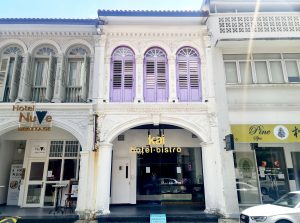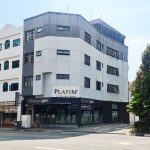Hotel Kai, a rare 999-year boutique hotel is up for sale at an indicative price of S$28.8 million. Colliers International put up the hotel for sale via an Expression of Interest (EOI) exercise on March 4th, 2021. The EOI exercise will close on Thursday, 8 April 2021, at 3 pm.
Hotel Kai a 32-room hotel, is for sale at an indicative price of S$28.8 million, translating to approximately S$3,345 psf or S$900,000 per key.
Table of Contents
This rare 999-year boutique hotel, Hotel Kai, is located in the heart of Singapore’s historic Civic District, in Bugis, 14 Purvis Street. Hotel Kai is a unique conservation shophouse underwent careful restoration and modernisation in 2010.
As Hotel Kai sits on a site zoned for “Hotel” use, foreigners are eligible to purchase the subject property. There is also no Additional Buyer’s Stamp Duty (ABSD) or Seller’s Stamp Duty (SSD) imposed on the property transaction.
Mr Steven Tan, Senior Director, Investment Services, said, “This unique property is to be sold with vacant possession, which represents a great opportunity for rebranding or repositioning the asset. The timeless property is located strategically within the bustling Purvis Street that has a high footfall and a plethora of high-end bistros and new-age cafes.” Mr Tan added, “This is an investment property which is the epitome of technical efficiency. Notably, as part of its modernisation process, this property has both a fully equipped kitchen and fully functioning bar.” Mr Tan added, “These types of properties are very versatile and are always considered a good investment.”
Mr Paul Ho, chief mortgage officer at iCompareLoan, said: “Towards the end of last year, the hospitality market got a boost with the virtual sale of Kyoto hotel. The sale of the boutique hotel came as optimism seems to be returning to the hospitality market.”
He added: “The global economic outlook is expected to remain subdued in the near term given the ongoing uncertainty and risks of new waves of COVID-19. But I am confident that the hospitality industry will rebound sharply after the vaccine becomes widely available by the end of 2021. Combined with TraceTogether, it could allow for some optimism and the return to at least a 70% travel economy starting mid-2021. When international travel without quarantine returns with the World Economic Forum which will convene the Special Annual Meeting 2021 in Singapore from 25-28 May, the industry’s legacy of resilience and agility will be seen.”
Mr Ho suggested, “Since this is the downtime for most hoteliers, they should take this opportunity to review their business strategies and position themselves for the eventual upturn.”
He added, “What they should do is, develop a pricing strategy to make their hotel more attractive once demands returns. Pricing room rates competitively is important as rooms priced lower would mean a slower hotel recovery for the real estate owners and investors.”
In an earlier report, Colliers International said that as markets start to recover, consumers will prioritise health, safety and hygiene when it comes to travel planning and decision making. Personal space will also be more important; instead of large tour groups, independent travel will take precedence and people will likely prefer bespoke holidays and seek out travel experiences with a purpose (such as health and wellness, eco-travel, etc.).
Technology will also take on a more critical role in the traveler ecosystem and be a key tool in the revival of travel. Robots, chatbots, automation, recognition technology, artificial intelligence (AI), internet of things (IoT) and virtual reality (VR) will become increasingly commonplace.
Although there is a wide variety of accommodation options in the East, there is still a gap for a boutique lifestyle brand that can cater to the aspiring new travelers who are willing to pay a premium for the product and location. With a well-thought-out concept, renovation and repositioning plan, The Malacca Hotel can fill this gap and capture the targeted segment.
Mr Ho said, “Hotel Kay is in a strategic location but it is unclear if hotel sector’s recovery will make a strong rebound after the circuit breaker period. Since this is the downtime for most hoteliers, they should take this opportunity to review their business strategies and position themselves for the eventual upturn.”
He added, “What they should do is, develop a pricing strategy to make their hotel more attractive once demands returns. Pricing room rates competitively is important as rooms priced lower would mean a slower hotel recovery for the real estate owners and investors.”
Colliers International in releasing the Hotel Insights Q4 2020 report in November last year said, “The global economic outlook is expected to remain subdued in the near term given the ongoing uncertainty and risks of new waves of COVID-19.”
Mr Govinda Singh, Colliers International’s Executive Director for Head of Hotels & Leisure in Asia, said: “However, the announcement of a vaccine that is expected to become widely available by the end of Q1 2021, combined with Track & Trace, could allow for some optimism and the return to at least a 70% travel economy starting mid-2021.We remain confident that the hospitality industry will rebound sharply. When international travel (without quarantine) returns, given the industry’s legacy of resilience and agility.”
Investors are still on the lookout for high-value quality assets, with significant pricing adjustments making listed entities prime targets for M&A opportunities. But Singapore remains among the most liquid markets which saw little investment sales during the past few quarters.
With international travel restrictions in place, markets with large domestic investment bases continue to have an advantage during times of challenged cross-border investment. In the coming months, investment activity is expected to gain pace as investors move to take advantage of any opportunities that will emerge.







